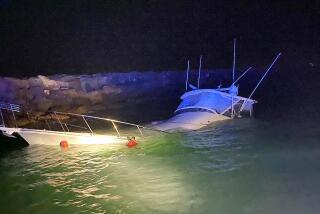Tough ‘Boozing Boater’ Bill Advanced by Senate Panel
- Share via
SACRAMENTO — The Senate Judiciary Committee approved a bill Tuesday that would subject drunken boaters to penalties and sobriety standards similar to those for intoxicated automobile drivers.
The bill is the centerpiece of a legislative campaign here to increase safety standards for California’s 2 million recreational boaters. The legislative effort is an outgrowth of a study commissioned three years ago after Assemblyman Peter Chacon (D-San Diego) tried unsuccessfully to toughen boating safety laws.
John Seymour (R-Anaheim), author of the “boozing boater” bill, said that although there are “obvious differences” between operating a boat and driving a car, tougher laws are needed on the waterways because of a recent increase in alcohol-related fatal accidents.
One example, Seymour noted, was an accident on Anaheim Bay on Halloween night, 1984, in which five people were killed when a power boat crashed into a buoy. The National Transportation Safety Board said intoxication of the driver was the major factor in the accident.
“It is time we tell people that this has gotten out of hand,” said Seymour, the Senate Republican Caucus chairman.
The measure, which was sent to the Senate Appropriations Committee on a 6-0 vote, is one of three boating safety bills pending in the Legislature.
The full Senate is expected to vote Thursday on a bill that would enact the state’s first age limit for boat operation--prohibiting youngsters under 14 from driving power boats of 10 or more horsepower without adult supervision.
That bill, by Senate Republican Leader James W. Nielsen of Woodland, also would establish a manslaughter statute that could send to prison boaters whose negligence causes deaths. Prosecutors now complain that boaters escape with mere fines and short jail sentences for the same degree of recklessness for which an automobile driver would go to prison under the vehicular manslaughter act.
On Monday, the Assembly Public Safety Committee passed a bill by Assemblyman Patrick Johnston (D-Stockton) that also would enact laws penalizing drunken boaters, restrict boat operation by minors under 12 and impose criminal penalties for boaters who leave the scene of an accident.
More than 600,000 pleasure craft navigate California’s coastal and inland waters, and legislators say these waterways are becoming increasingly overcrowded and unsafe.
A report released late last year by the State Department of Boating and Waterways estimated that alcohol was a factor in 59% of all fatal boating accidents during the two-year study period. The study also showed that under-age boaters were involved in accidents at more than twice the rate of adult operators.
Chacon’s 1983 bill, which was watered down to merely call for the study, would have enacted most of the changes being sought by legislators this year. But Chacon’s bill was stalled after heavy lobbying by boaters and pleasure craft manufacturers and dealers.
Besides toughening penalties, Seymour’s bill would establish the same 0.10 blood alcohol level for boaters that defines intoxication for automobile drivers. A boater who refuses to take a sobriety test would face an additional two to four days in jail on top of the sentence for operating a vessel while under the influence of alcohol.
Initially, Seymour had sought to ban a convicted “boozing boater” from operating a vessel for three years. But some Judiciary Committee members argued that this provision would be unenforceable because California does not issue operator’s licenses for boaters.
Although Gov. George Deukmejian tried unsuccessfully to enact a boater licensing law in 1971, when he was a state senator, William H. Ivers, director of the state boating department, said his department would oppose a licensing requirement because it would be too costly to set up and administer.
Only 10 states and the District of Columbia have boater operating licenses. Most of them are mainly identification cards, involving no tests or competency standards.
More to Read
Sign up for Essential California
The most important California stories and recommendations in your inbox every morning.
You may occasionally receive promotional content from the Los Angeles Times.













